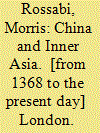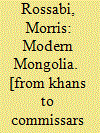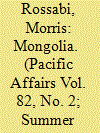|
|
|
Sort Order |
|
|
|
Items / Page
|
|
|
|
|
|
|
| Srl | Item |
| 1 |
ID:
044171


|
|
|
|
|
| Publication |
London, Thames and Hudson, 1975.
|
| Description |
320p.
|
|
|
|
|
|
|
|
|
|
|
|
Copies: C:1/I:0,R:0,Q:0
Circulation
| Accession# | Call# | Current Location | Status | Policy | Location |
| 016220 | 327.5105/ROS 016220 | Main | On Shelf | General | |
|
|
|
|
| 2 |
ID:
058144


|
|
|
|
|
| Publication |
Seattle, University of Washington Press, 2004.
|
| Description |
viii, 296p.
|
| Series |
Studies on ethnic groups in China
|
| Standard Number |
0295983906
|
|
|
|
|
|
|
|
|
|
|
|
Copies: C:1/I:0,R:0,Q:0
Circulation
| Accession# | Call# | Current Location | Status | Policy | Location |
| 049019 | 323.151/ROS 049019 | Main | On Shelf | General | |
|
|
|
|
| 3 |
ID:
062770


|
|
|
|
|
| Publication |
Berkeley, University of California Press, 2005.
|
| Description |
xx, 397p.pbk
|
| Standard Number |
0520244192
|
|
|
|
|
|
|
|
|
|
|
|
Copies: C:1/I:0,R:0,Q:0
Circulation
| Accession# | Call# | Current Location | Status | Policy | Location |
| 049770 | 951.73/ROS 049770 | Main | On Shelf | General | |
|
|
|
|
| 4 |
ID:
090968


|
|
|
|
|
| Publication |
2009.
|
| Summary/Abstract |
The Mongolian People's Revolutionary Party (MPRP), founded in 1924, ruled Mongolia as a one-party communist state until 1990. Following the model of the Soviet Union, it imposed a dictatorial government which engaged in a purge leading to the deaths of about 25,000 people, undermined Buddhism, and collectivized the herds. On the other hand, it fostered industrialization and urbanization, introduced modern educational and medical systems, and provided a social safety net for the 183 population. Yet it kept Mongolia isolated from the rest of the world. The fall of communism transformed the MPRP. To hold power, it aligned itself with international financial organizations, which required acquiescence to a shock therapy of rapid privatization, liberalization of trade, elimination of price subsidies, a balanced budget and minimalist government, resulting in increased corruption, unemployment, and greater income inequality. Poverty soared, health and education suffered, and the social safety net was frayed. Market solutions, which both the international financial organizations and the MPRP championed, did not resolve these problems. To be sure, democracy and civil liberties have made great strides, and elections until the summer of 2008 were fair and free of violence. However, parlous economic conditions do not augur well for the future. The MPRP has deviated from its social message of economic democracy and equality of economic opportunity, and the 2008-2009 world-wide financial crisis has exacerbated its problems.
|
|
|
|
|
|
|
|
|
|
|
|
|
|
|
|
| 5 |
ID:
172459


|
|
|
|
|
| Summary/Abstract |
In 2019, Mongolia sought to recover from a scandal over corruption that reached the highest levels of government. An ineffective Anti-Corruption Agency, as well as poverty and environmental degradation, plagued the economy. In contrast, Mongolia bolstered economic and diplomatic relations with Russia, China, Japan, and the West.
|
|
|
|
|
|
|
|
|
|
|
|
|
|
|
|
| 6 |
ID:
179241


|
|
|
|
|
| Summary/Abstract |
Mongolia in 2020 recorded no COVID-19 deaths, despite its proximity to China, the original hotbed of the outbreak. Yet GDP and exports decreased and unemployment, poverty, crime, and domestic abuse rose, in large part due to the disease. Facing desertification, climate change, overgrazing, and mining damage to pastureland, herders who could not eke out a living continued to migrate to Ulaanbaatar, the capital city, and lived in tents, with no running water and poor sanitation. Elections for the Parliament were held, with the Mongolian People’s Party dominating, but corruption and accusations of money laundering prompted a lack of faith in the government. On the other hand, Mongolia maintained cordial relations with China and Russia, its neighbors, as well as with distant countries.
|
|
|
|
|
|
|
|
|
|
|
|
|
|
|
|
|
|
|
|
|